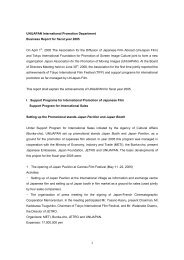The Guide to Japanese Film Industry & Co -Production - UNIJAPAN
The Guide to Japanese Film Industry & Co -Production - UNIJAPAN
The Guide to Japanese Film Industry & Co -Production - UNIJAPAN
You also want an ePaper? Increase the reach of your titles
YUMPU automatically turns print PDFs into web optimized ePapers that Google loves.
Chapter 1<br />
Japan’s<br />
<strong>Film</strong><br />
<strong>Industry</strong><br />
Postwar <strong>Japanese</strong> <strong>Film</strong> <strong>Industry</strong> and Development<br />
Postwar <strong>Japanese</strong> <strong>Film</strong> <strong>Industry</strong> and Development<br />
1. <strong>Japanese</strong> <strong>Film</strong> after World War II<br />
By Kakeo Yoshio, Executive Direc<strong>to</strong>r, Kinema Junpo <strong>Film</strong> Institute<br />
<strong>The</strong> <strong>Japanese</strong> film industry after the defeat of Japan in World War II in<br />
1945 started under the control of the General Headquarters (GHQ).<br />
<strong>The</strong> industry was under the direct management of the Motion Picture<br />
and <strong>The</strong>atrical Unit of the Civil Information and Education Section in<br />
the GHQ. Representatives of the film companies were assembled and an<br />
announcement was made on September 22 that the underlying themes for<br />
films were <strong>to</strong> be “abolishment of militarism,” “promotion of liberalism”<br />
and “establishment of pacifism.”<br />
<strong>The</strong> number of <strong>Japanese</strong> films shown in the cinemas from the day<br />
Japan was defeated in World War II, August 15, 1945, <strong>to</strong> the end of that year<br />
was 12 films, out of which the majority had been banned from screening<br />
during the war as they were considered <strong>to</strong> be pro-America. <strong>The</strong> first postwar<br />
<strong>Japanese</strong> film Soyokaze (1945; directed by: Sasaki Yasushi, starring: Sano<br />
Shuji) was produced by Shochiku which became a great hit <strong>to</strong>gether with<br />
its main theme song Ringo no uta sung by Namiki Michiko. <strong>The</strong> cinemas<br />
at the time still showed signs of the war; the buildings were still half burnt<br />
down with steel beams showing their faces and obviously short of seats. <strong>The</strong><br />
film industry, however, became a booming market and people swarmed <strong>to</strong><br />
the cinemas as the population increased with the returnees from China and<br />
the demobilized veterans, as well as from the relief that the war was over.<br />
<strong>The</strong> <strong>Japanese</strong> film industry revived rapidly as the prime entertainment<br />
for the <strong>Japanese</strong> people. In 1951, Rashomon directed by Kurosawa Akira<br />
won the Golden Lion (Leone d’Oro) at the Venice International <strong>Film</strong><br />
Festival. <strong>Japanese</strong> films were at its height in the 1950s as they won a number<br />
of awards at the international film festivals.<br />
title (year) film festival / award direc<strong>to</strong>r<br />
Rashomon (’51) Venice <strong>Film</strong> Festival / Golden Lion KUROSAWA Akira<br />
Gate of Hell<br />
(Jigokumon) (’54)<br />
Cannes <strong>Film</strong> Festival / Palme d’Or KINUGASA Teinosuke<br />
Twenty-Four Eyes Golden Globes / KINOSHITA Keisuke<br />
(Nijushi no hi<strong>to</strong>mi) (’54) Golden Globe Award for Best Foreign <strong>Film</strong><br />
Musashi Miyamo<strong>to</strong> Academy Awards / INAGAKI Hiroshi<br />
(Miyamo<strong>to</strong> Musashi) (’55) Best Foreign Language <strong>Film</strong><br />
<strong>The</strong> S<strong>to</strong>ry of Pure Love<br />
(Junai monogatari) (’58)<br />
Berlin <strong>Film</strong> Festival / Best Direc<strong>to</strong>r Award IMAI Tadashi<br />
Rickshaw Man<br />
(Muhomatsu no issho) (’58)<br />
Venice <strong>Film</strong> Festival / Golden Lion INAGAKI Hiroshi<br />
6 7




